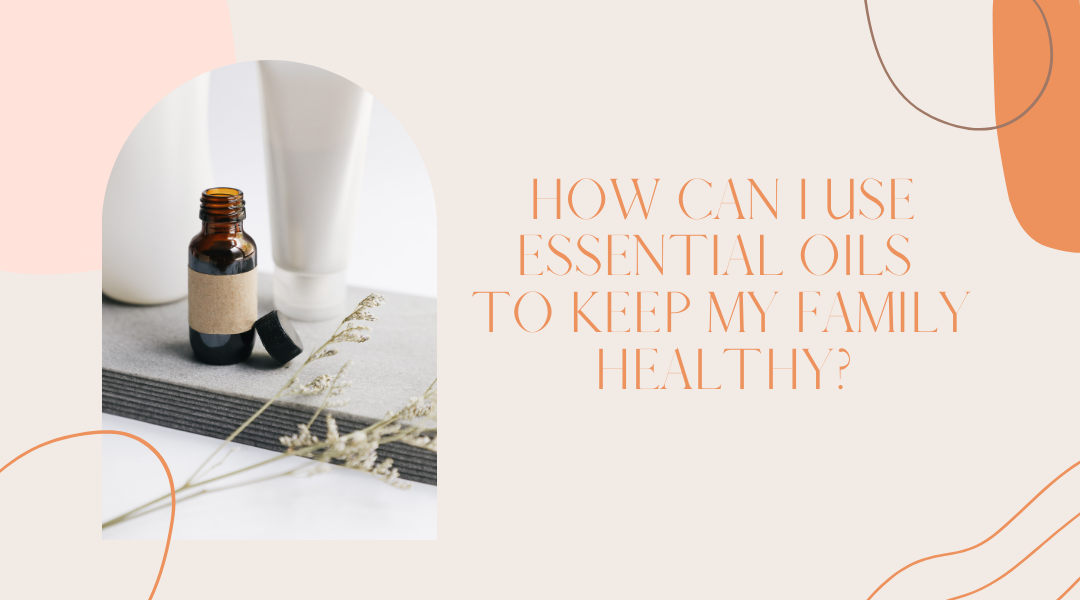As more families turn to natural remedies, essential oils have become a popular choice for supporting health and wellness. These powerful plant-based extracts offer a variety of benefits, from boosting immunity to improving sleep and reducing stress. But with so many options available, you might wonder, How can I use essential oils to keep my family healthy?
In this guide, we’ll explore the top ways to incorporate essential oils into your daily routine, including practical tips for safe use around children.
1. What Are Essential Oils?
Essential oils are highly concentrated extracts from plants, capturing their natural aromas and beneficial properties. Each oil has unique compounds that can support physical and emotional health. For example:
- Lavender: Known for its calming and sleep-enhancing properties.
- Tea Tree: A natural antimicrobial for skin and cleaning.
- Peppermint: Helps with digestion and energy.
- Eucalyptus: Supports respiratory health.
2. Benefits of Essential Oils for Family Health
Essential oils can be used in various ways to promote health and wellness for the whole family. Here are some key benefits:
- Boosting Immunity: Oils like eucalyptus, frankincense, tea tree, and Thieves can help support the immune system.
- Improving Sleep: Lavender and chamomile are ideal for bedtime routines.
- Reducing Stress: Essential oils such as bergamot, ylang-ylang, and frankincense can create a calming atmosphere.
- Soothing Skin Issues: Tea tree and lavender are excellent for minor cuts, burns, and insect bites.
- Supporting Respiratory Health: Diffusing peppermint or eucalyptus can help clear airways.
3. How to Use Essential Oils Safely
When used correctly, essential oils can be a safe and effective tool for natural health. Follow these guidelines to ensure safety, especially when using oils with children:
Dilute Properly
Essential oils are potent and should always be diluted with a carrier oil, like coconut, jojoba, or almond oil, before applying to the skin.
- Adults: Use a 2-3% dilution (2-3 drops of essential oil per teaspoon of carrier oil).
- Children: Use a 1% dilution (1 drop of essential oil per teaspoon of carrier oil).
Choose Kid-Safe Oils
Not all essential oils are safe for children. Stick to gentle options like lavender, chamomile, and sweet orange for kids under 10. Avoid oils like peppermint and eucalyptus for children under 6 due to potential respiratory risks.
Patch Test First
Always test a small amount on the skin before full application to check for sensitivity.
Avoid Ingesting Oils
Oral use of essential oils should only be done under the guidance of a certified aromatherapist or healthcare provider.
4. Top Ways to Use Essential Oils for Family Health
Aromatherapy
Diffuse essential oils to create a calming, energizing, or purifying atmosphere in your home. A few drops in a diffuser can make a big difference.
- For Immune Support: Diffuse tea tree, lemon, and eucalyptus.
- For Relaxation: Use lavender, ylang-ylang, or chamomile.
Topical Applications
Apply diluted essential oils to the skin for targeted support.
- For Sleep: Rub lavender oil on the bottoms of feet or pulse points before bed.
- For Sore Muscles: Use a mix of peppermint and eucalyptus on the affected area.
DIY Cleaning Products
Replace chemical-laden cleaners with natural alternatives made with essential oils.
- All-Purpose Cleaner: Mix water, vinegar, and 10 drops of tea tree oil for a non-toxic solution.
- Air Freshener Spray: Combine water and a few drops of citrus oils like lemon or orange.
Bath Time
Add a few drops of essential oil (mixed with a carrier oil or bath salts) to a warm bath for relaxation or respiratory support.
5. Which Essential Oils Should I Keep on Hand?
For families, these essential oils are versatile and effective:
- Lavender: Calming, sleep-enhancing, and soothing for skin.
- Tea Tree: Antimicrobial and perfect for cleaning or minor skin irritations.
- Peppermint: Great for headaches, digestion, and energy (use with caution for kids).
- Lemon: Refreshing, immune-boosting, and excellent for cleaning.
- Frankincense: Supports immune health and promotes relaxation.
- Eucalyptus: Helps with respiratory issues (for older children and adults).
- Chamomile: Calming and gentle enough for young children.
6. Why Quality Matters
Not all essential oils are created equal. Choose high-quality, therapeutic-grade oils to ensure their safety and effectiveness. Look for brands that:
- Provide GC/MS (Gas Chromatography/Mass Spectrometry) test results.
- Use organic or sustainably sourced plants.
- Avoid additives or synthetic ingredients.
7. Precautions and Warnings
While essential oils offer many benefits, it’s important to use them responsibly.
- Keep oils out of reach of children to prevent accidental ingestion.
- Avoid direct contact with eyes or mucous membranes.
- Consult with a healthcare professional if you are pregnant, nursing, or have underlying health conditions.
Conclusion
Essential oils are a powerful, natural way to keep your family healthy, from boosting immunity to creating a calm and inviting home environment. By choosing high-quality oils, following safe usage guidelines, and incorporating them into your daily routines, you can unlock their full potential.
Ready to get started? Explore my Essential Oils Wishlist for all of my favorite essential oil products!
Want a more comprehensive wellness guide? Grab one of my seasonal bundles and thrive in every season!
